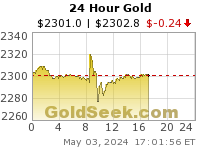Robert Prechter Explains the Price Effects of Inflation and Deflation
Editor’s Note: On Nov. 19, 2008, the U.S. Labor Department reported a 1 percent drop in the consumer price index for October 2008. The drop marked the largest decline in 61 years, and it was the first decline in that measure in nearly a quarter of a century. The 1 percent drop was twice as large as many mainstream analysts had forecast. Such a large decline in consumer prices is forcing U.S. policymakers to rethink the possibility of deflation in America. For more on deflation, we turn to Robert Prechter, the man who literally wrote a book on how to survive it. The following article, adapted from Prechter’s book Conquer the Crash – You Can Survive and Prosper in a Deflationary Depression, will help you understand exactly what to expect from deflation.
In addition to this article, visit Elliott Wave International to download the free 8-page report, Inflation vs. Deflation. It contains details on which threat you should prepare for and steps you can take to protect your money.
By Robert Prechter, CMT
Before explaining the price effects of inflation and deflation, we must define the terms inflation, deflation, money, credit and debt.
Webster's says, "Inflation is an increase in the volume of money and credit relative to available goods," and "Deflation is a contraction in the volume of money and credit relative to available goods."
Money is a socially accepted medium of exchange, value storage and final payment. A specified amount of that medium also serves as a unit of account.
According to its two financial definitions, credit may be summarized as a right to access money. Credit can be held by the owner of the money, in the form of a warehouse receipt for a money deposit, which today is a checking account at a bank. Credit can also be transferred by the owner or by the owner's custodial institution to a borrower in exchange for a fee or fees – called interest – as specified in a repayment contract called a bond, note, bill or just plain IOU, which is debt. In today's economy, most credit is lent, so people often use the terms "credit" and "debt" interchangeably, as money lent by one entity is simultaneously money borrowed by another.
When the volume of money and credit rises relative to the volume of goods available, the relative value of each unit of money falls, making prices for goods generally rise. When the volume of money and credit falls relative to the volume of goods available, the relative value of each unit of money rises, making prices of goods generally fall. Though many people find it difficult to do, the proper way to conceive of these changes is that the value of units of money are rising and falling, not the values of goods.
The most common misunderstanding about inflation and deflation – echoed even by some renowned economists – is the idea that inflation is rising prices and deflation is falling prices. General price changes, though, are simply effects of inflation and deflation.
The price effects of inflation can occur in goods, which most people recognize as relating to inflation, or in investment assets, which people do not generally recognize as relating to inflation. The inflation of the 1970s induced dramatic price rises in gold, silver and commodities. The inflation of the 1980s and 1990s induced dramatic price rises in stock certificates and real estate. This difference in effect is due to differences in the social psychology that accompanies inflation and disinflation, respectively.
The price effects of deflation are simpler. They tend to occur across the board, in goods and investment assets simultaneously.
…………….
For more information on deflation and inflation, including money-saving steps for protecting your wealth, download Elliott Wave International’s free 8-page report, Inflation vs. Deflation.
Robert Prechter, Chartered Market Technician, is the world's foremost expert on and proponent of the deflationary scenario. Prechter is the founder and CEO of Elliott Wave International, author of Wall Street best-sellers Conquer the Crash and Elliott Wave Principle and editor of The Elliott Wave Theorist monthly market letter since 1979.
Subscribe to:
Post Comments (Atom)


Prechter has been bearish for a very long time.
ReplyDeleteThat's correct. So it's good (for me, and all of us) to keep Prechter's market view posted. Good reminders.
ReplyDelete江恩认为耐心是成功的重要素养
ReplyDelete江恩认为耐心是成功的重要素养
ReplyDelete一命二运三风水,四积功德五读书。六名七相八敬神,九交贵人十养生。
ReplyDelete